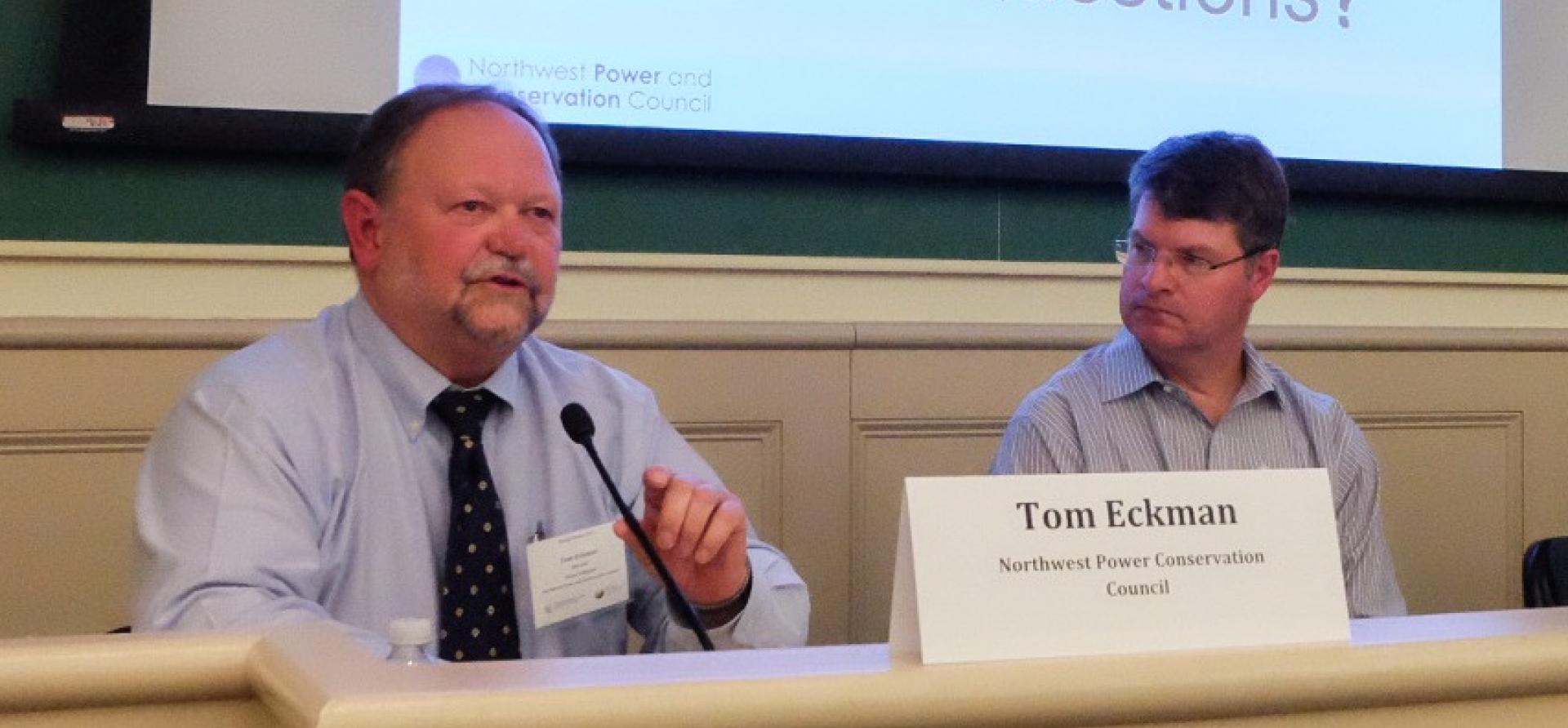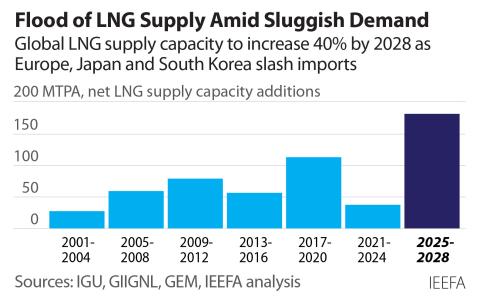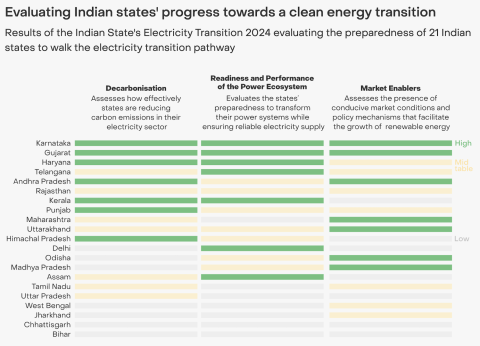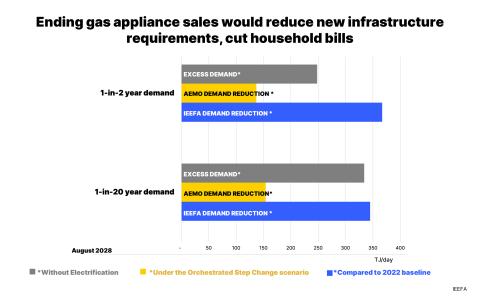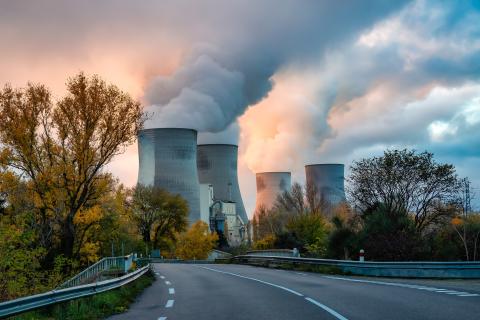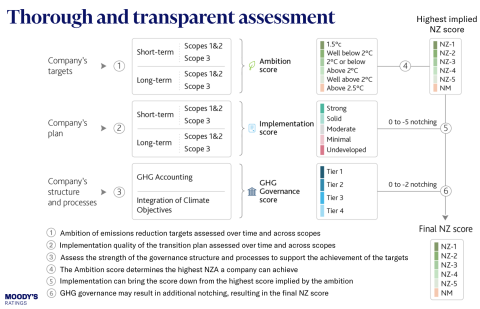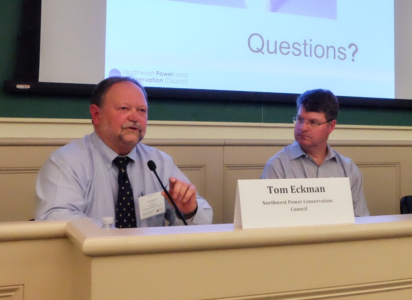
Tom Eckman of the Northwest Power Conservation Council and IEEFA’s Tim Buckley at Energy Finance 2015, which runs through Thursday at New York University.
One of the notable remarks today from Energy Finance 2015 comes from Jim Hempstead, associate managing director in the Global Project and Infrastructure Finance Group at Moody’s Investor Service.
Hempstead: “We have not met a utility company yet, or an unregulated power company, that is afraid of 111d.”
Translated: the U.S. utility industry is prepared to meet the new level of Clean Air Act enforcement the EPA is planning to implement. Hempstead added that Moody’s faith in the ability of utility companies to comply with the standards is such that the rating agency is maintaining a stable outlook on utilities broadly.
What’s happening in Ohio is another story, Hempstead said, speaking to efforts by FirstEnergy and American Electric Power to get the Public Utility Commission of Ohio to grant new power purchase agreements that would subsidize aging coal-fired power plants for both companies.
Hempstead: “If the Commission moves forward with the PPAs, then we actually think that’s a big credit negative for everybody in Ohio, because they’re taking a step back … That is not transparent, that is not stable, that is backtracking.”
Hempstead spoke on a utility-industry panel at the conference, which runs through tomorrow at NYU (here’s the schedule).
Dan Bakal, director of Electric Power Programs for CERES, a nonprofit organization that works to mobilize investors and businesses presented a more disruptive vision of the future of utility companies.
“It’s amazing how fast change has been coming to the sector,” said Bakal, pointing to several very developments in just the past few days:
- SolarCity’s plans to invest heavily in solar microgrids that combine distributed solar, batteries and controllable loads to give municipalities, remote communities, military bases and hospitals cleaner, more resilient, more affordable power.
- Colorado’s momentum around a ‘Utility of the Future’ bill that imposes performance-based regulation on utilities
- Michigan Gov. Rick Synder’s proposal for a 10-year energy plan aiming a statewide 40 percent clean-energy consumption by 2025
- A bill in North Carolina allowing for renewable-power sales direct to consumers.
NEW STUDY SHOWS MORE COAL PLANTS ARE DROPPED THAN BUILT
The Sierra Club and Coalswarm on Tuesday released a new report at the conference that showed two-thirds of all new coal plants globally over the past two years have been put on hold or cancelled,
“We would argue that this marks the beginning of a slowdown in the coal plant boom,” said Christine Shearer, program director for Coalswarm.
Shearer said the trend is especially evident in India, where six plants were abandoned for every one built. Two trends are at work:
- Citizen opposition, Shearer said, has damped public support for such projects.
- Indian banks are feeling overexposed to the coal sector, a problem that has been apparent in lagging debt repayments, said Ashish Fernandes, a U.S.-India climate advisor to Greenpeace (“Even after the hype of the new government coming in and promising economic reform and pushing the coal sector, we see that investors are very cautious and very few new coal projects are being talked about at all.”
Panelist Nityanand Jayaraman added this: “When fossil fuels are phased out, is it victory? Or,do we still have some work to do after the fossil fuels are phased out, which means rehabilitation of affected communities and rehabilitation of workers who are in the fossil-fuel business.”
‘CHINA IS TRYING TO BECOME MORE ENERGY EFFICIENT’
China is leading the new energy transformation in Asia, argued Calvin Quek, head of sustainable finance for Greenpeace East Asia.
“China is trying to become more energy efficient,” Quek said. “Its economy has been over-reliant on heavy industry development.”
Chinese leaders have steered the country recently both toward more efficient use of coal toward rapid development of non-fossil-fuel energy sources. Among recent policy trends of noted, he said, is the government’s decision to drop its coal-gasification program.
Nicole Ghio of the Sierra Club’s international team said similar trends are emerging in Spain, Kosovo and Turkey.
Ghio: “Thanks to advances in technology and conferences like this one and a number of other forums, people are starting to talk to each other. For years and years people felt that they were alone in these fights. And now you’re seeing people from around the world come together and share stories, share resources, share expertise, and you really are seeing a global coal movement where all of these individual local fights are starting to link up in new and exciting ways.”
Jim Flood is an IEEFA contributor.

